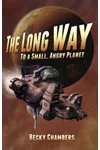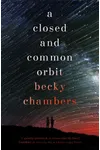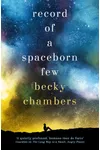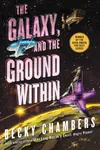Step aboard the Wayfarer and blast off into the vibrant universe of Becky Chambers’ Wayfarers series, a Hugo Award-winning space opera that’s as heartwarming as it is expansive. This isn’t your typical laser-battle sci-fi; it’s a cozy, character-driven journey through a galaxy brimming with diverse species, found families, and big questions about what it means to belong.
With its optimistic take on humanity’s future and a knack for weaving intimate stories against a cosmic backdrop, Wayfarers has charmed readers and redefined modern space opera. Ready to explore a universe where connection trumps conflict? Let’s dive in!
How Wayfarers Began
Becky Chambers, a Southern California native with a passion for space exploration, launched the Wayfarers series with a bold move: self-publishing her debut novel, The Long Way to a Small, Angry Planet, in 2014 via a successful Kickstarter campaign. Inspired by her family’s ties to NASA—her parents are an astrobiology educator and a satellite engineer—Chambers crafted a universe that celebrates cooperation over conquest. The novel’s critical acclaim led to a publishing deal with Hodder & Stoughton and Harper Voyager, kicking off a quartet that would win the 2019 Hugo Award for Best Series.
The Heart of Wayfarers
The Wayfarers series spans four novels, each a standalone story set in the Galactic Commons, a bustling interspecies alliance where humans are scrappy newcomers. The Long Way to a Small, Angry Planet follows Rosemary Harper, a clerk on the Wayfarer, a ship that punches wormholes for interstellar travel. The diverse crew—think reptilian pilots and chatty engineers—navigates personal dramas and a risky mission, forming bonds that feel like a galactic hug.
A Closed and Common Orbit shifts to an AI named Lovelace, reborn in an illegal android body, and her friend Pepper, exploring identity and freedom. Record of a Spaceborn Few dives into the Exodan fleet, humanity’s spacefaring home, tackling community and legacy. The Galaxy, and the Ground Within wraps the series at a cosmic rest stop, where stranded travelers from different species find common ground. Themes of diversity, empathy, and hope shine through, with queer, non-binary, and polyamorous characters seamlessly woven into a normalized future. Chambers’ style—intimate, witty, and optimistic—makes the galaxy feel like a cozy neighborhood.
Why Wayfarers Resonates
Wayfarers stands out in sci-fi for its hopepunk ethos, a term Chambers helped popularize, emphasizing kindness and resilience over dystopian grit. Fans adore its relatable characters and inclusive world, calling it a “warm hug in book form.” Its impact stretches beyond literature, inspiring readers to imagine futures where differences are celebrated, not feared. The series’ blend of social commentary—on colonialism, xenophobia, and identity—with feel-good storytelling has cemented its place as a modern classic.
- About Wayfarers
- Publication Years: 2015–2021
- Number of Books: 4
- Awards: 2019 Hugo Award for Best Series
- Genre: Space Opera / Hopepunk
Grab The Long Way to a Small, Angry Planet and soar into Wayfarers’ galaxy of heart, humor, and hope. Your cosmic adventure awaits!



